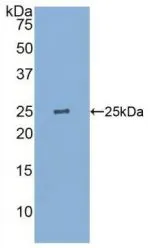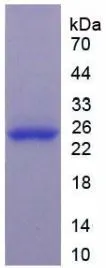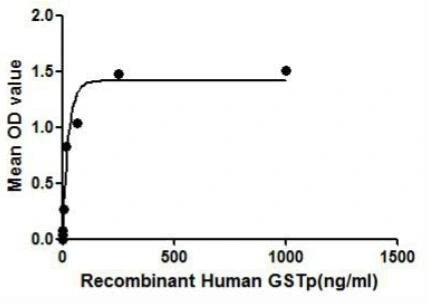
WB analysis of GTX00125-pro Human GSTP1 protein.
Human GSTP1 protein, His tag
GTX00125-PRO
Product group Molecular Biology
Overview
- SupplierGeneTex
- Product NameHuman GSTP1 protein (active)
- Delivery Days Customer9
- Application Supplier NoteGSTp (Glutathione S-transferase P) is an enzyme that plays an important role in detoxification by catalyzing the conjugation of many hydrophobic and electrophilic compounds with reduced glutathione. GSTP1 is identified as a CDK5 (Cyclin dependent kinase-5) regulatory protein, and is thought to regulates negatively CDK5 activity via p25/p35 translocation. Thus a binding ELISA assay was conducted to detect the interaction of recombinant human GSTp and recombinant human CDK5. Briefly, GSTp were diluted serially in PBS, with 0.01% BSA (pH 7.4). Duplicate samples of 100 microl were then transferred to CDK5-coated microtiter wells and incubated for 2h at 37C. Wells were washed with PBST and incubated for 1h with anti-GSTp pAb, then aspirated and washed 3 times. After incubation with HRP labelled secondary antibody, wells were aspirated and washed 3 times. With the addition of substrate solution, wells were incubated 15-25 minutes at 37C. Finally, add 50 microl stop solution to the wells and read at 450nm immediately. The binding activity of of GSTp and CDK5 was in a dose dependent manner.
- ApplicationsFunctional Assay
- CertificationResearch Use Only
- ConjugateUnconjugated
- Scientific DescriptionGlutathione S-transferases (GSTs) are a family of enzymes that play an important role in detoxification by catalyzing the conjugation of many hydrophobic and electrophilic compounds with reduced glutathione. Based on their biochemical, immunologic, and structural properties, the soluble GSTs are categorized into 4 main classes: alpha, mu, pi, and theta. This GST family member is a polymorphic gene encoding active, functionally different GSTP1 variant proteins that are thought to function in xenobiotic metabolism and play a role in susceptibility to cancer, and other diseases. [provided by RefSeq, Jul 2008]
- Storage Instruction-20°C or -80°C,2°C to 8°C
- UNSPSC12352204


